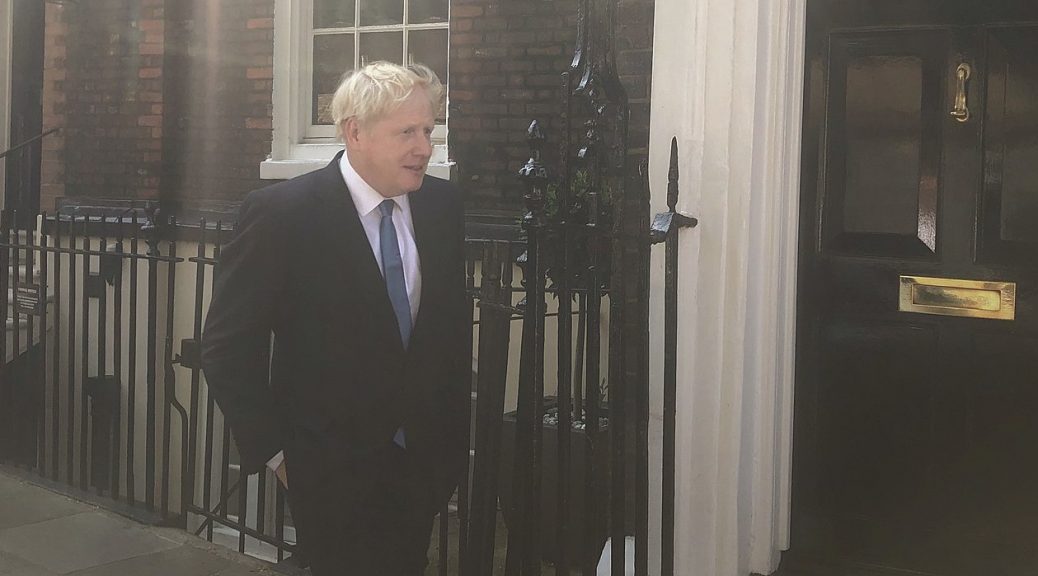
Bring Boris Back? British Politicians, Churchillian Nicknames
Floorcross to Buckethead
British politicians have such wonderful names. Ed Balls. Mark Reckless. Lord Buckethead, who won 125 votes running against Boris Johnson in Uxbridge for the Monster Raving Looney Party.
If your own name’s not fun enough, your fellow MPs may give you a more amusing one. In the postwar Labour government, Attorney General Sir Hartley Shawcross began sounding more and more conservative. His fellow MPs dubbed him Sir Shortly Floorcross. [1]
The tradition continues. A few years ago, when Tory Deputy Chief Whip Chris Pincher was involved in a sex scandal, Prime Minister Boris Johnson dubbed him “Pincher by name, pincher by nature.” The laugh was on Boris for covering up and not sacking him back then. And when another escapade erupted in June, it was Boris who was pinched.
In July, facing mass cabinet resignations, he agreed to step down when the party selects his successor in September. So now, 180,000 party members will vote for one of two surviving contenders. They include—who else?—Liz Truss and her support team. (See what I mean about names?) Ms. Truss just deleted a tweet: “I promise to hit the ground from day one.”
Will Boris return?
Now we have a distinguished peer named Lord Cruddas of Shoreditch. What would Winston Churchill have made of that moniker? Lord Credence of Lastditch, perhaps….
Because, given the choices before the party, Lord Cruddas and others would like Boris Johnson to stay. So the noble lord is backing a petition for Tory MPs to have a say on his future.
Why not? Lord Cruddas asks: “Boris is a very articulate, very well-educated, classically educated person.” Johnson was scintillating in his final Prime Minister’s Questions, closing with a Churchillian admonition: “Keep in with the Americans.” A party member wrote me: “Nobody comes near to him in terms of panache. That was pure Winston Churchill.” [2] Boris received a standing ovation from Tory MPs, and even a collegial farewell from the Leader of the Opposition.
Lord Cruddas correctly notes that Boris is not channeling WSC. Churchill increased his own plurality in 1945, but was thrown out as PM when Labour swept the general election. It took him six years to return to 10 Downing Street, still head of his party. Boris was ejected by his fellow Tories, and has already resigned as party leader.
But Churchill did make a lot of comebacks, and British politics may not have seen the last of Johnson. The Daily Express suggests that he deployed the wrong Schwarzenegger line when he wound up question time with “Hasta la vista, baby.” They think what he really meant was, “I’ll be back.” (Maybe as NATO secretary-general.)
Churchillian nicknames
A sampler from Churchill by Himself:
“Admiral de Row-Back”: Admiral of the Fleet Sir John Roebeck (1862-1928) commanded the initial Anglo-French attempt to force the Dardanelles. Martin Gilbert: “[In] the immediate aftermath of the setback of 18 March, had the Admiral tried again, he would have had a good chance of success. The Admiral was John de Robeck. Churchill, who loved nicknames, quickly dubbed him Admiral ‘de Row-back.’” —Spring 1915 [3]
“Can’tellopolus”: Panagiotis Kanellopoulos (1902–1986), Greek prime minister, 1945, 1967. WSC: “Kanellopoulos, Can’tellopolus, Kantellopolous.… All right. I’ll see him!” —Cairo, August 1942 [4]
“Prince Palsy”: Prince Paul of Yugoslavia (1893–1976), Regent of Yugoslavia for King Peter II from 1934 until he signed a pact with Nazi Germany, March 1941. WSC: “Our intervention in Greece caused the revolution in Yugoslavia which drove out Prince ‘Palsy,’ and delayed the German invasion of Russia by six weeks.” —August 1948 [5]
“Pug”: Hastings Lionel Ismay, First Baron Ismay (1887-1965), Churchill’s chief military assistant 1940-45, first NATO Secretary General, 1952-57. Louis Spears: “His expression explained his nickname Pug. It was a natural…. His rather prominent eyes had the quality which make men love dogs [with their] unwavering loyalty…” [6]
“Stifford Crapps”: Sir Richard Stafford Cripps (1889–1952), Labour MP, Ambassador to Russia and Minister of Aircraft Production in the wartime coalition, chancellor of the Exchequer in the postwar Labour Government. Anthony Montague Browne: “WSC used to refer to him as ‘Stifford Crapps’ and once remarked, ‘There, but for the Grace of God, goes God.’” —Circa 1952-55 [7]
“Useless Percy”: Eustace Percy, First Baron of Newcastle (1887-1958), diplomat; Conservative peer, President Board of Education, 1924-29. WSC to his wife: “Neville [Chamberlain, Minister of Education] is costing £2 1/2 millions more and Lord Useless Percy the same.” —30 October 1927 [8]
References
1. Sir Hartley William Shawcross, Baron Shawcross (1902-2003), barrister; Labour MP for St. Helens, Lancs., 1945-58. Lead British prosecutor at the Nuremberg War Crimes tribunal, attorney general for England and Wales. He never crossed the floor, and lived to be 101. Colin Thornton-Kemsley, Through Winds and Tides (Montrose: Standard Press, 1974), 221.
2. Churchill’s final words to his non-Cabinet ministers as he retired on 5 April 1955 were: “Never be separated from the Americans.” Richard M. Langworth, ed., Churchill by Himself (New York: Rosetta, 2016), 121.
3. Martin Gilbert, In Search of Churchill: A Historian’s Journey (London: Collins, 1994), 58.
4. Anthony Eden, The Reckoning (London: Cassell, 1965), 339.
5. Robert Boothby, Recollections of Rebel (London: Hutchinson, 1978), 61.
6. Louis Spears, Assignment to Catastrophe, vol. 1, Prelude to Dunkirk, July 1939-May 1940 (London: Heinemann, 1954), 161.
7. Anthony Montague Browne, Long Sunset: Memoirs of Winston Churchill’s Last Private Secretary (London: Cassell, 1995), 76.
8. Martin Gilbert, Winston S. Churchill, vol. V, Prophet of Truth 1922-1939 (Hillsdale, Mich.: Hillsdale College Press, 2009), 249.
More on Boris and nicknames
“Churchill’s Potent Political Nicknames,” 2020
“Boris, Racism, and ‘The Road to Mandalay,’” 2019
“Johnson, Trump…Can We Stop Comparing Everybody to Churchill?,” 2019
“Boris Says the Strangest Things,” 2014.
“Boris: What Winston Churchill Would Do,” 2014






